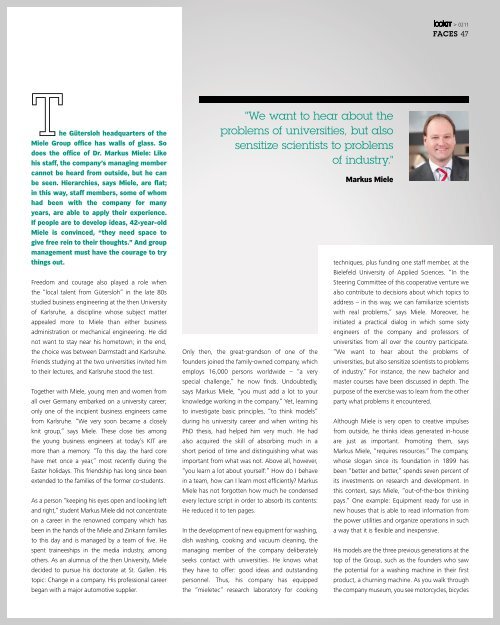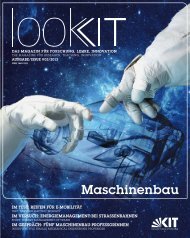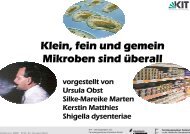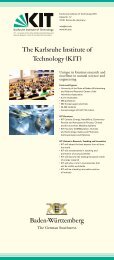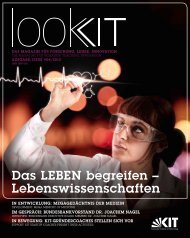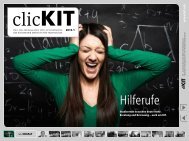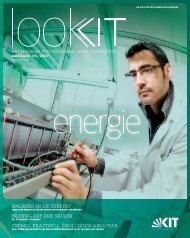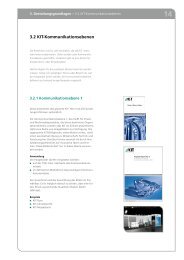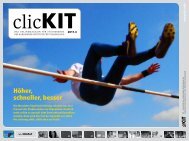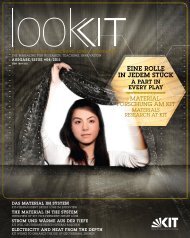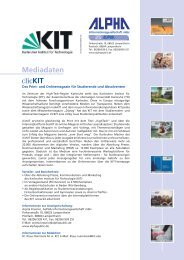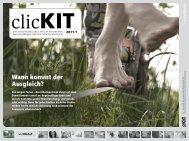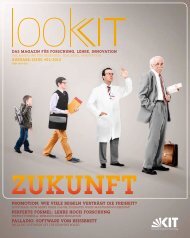lookKIT 02/2011 - PKM - KIT
lookKIT 02/2011 - PKM - KIT
lookKIT 02/2011 - PKM - KIT
Erfolgreiche ePaper selbst erstellen
Machen Sie aus Ihren PDF Publikationen ein blätterbares Flipbook mit unserer einzigartigen Google optimierten e-Paper Software.
<strong>02</strong>11<br />
faces 47<br />
he Gütersloh headquarters of the<br />
Miele Group office has walls of glass. So<br />
does the office of Dr. Markus Miele: Like<br />
his staff, the company’s managing member<br />
cannot be heard from outside, but he can<br />
be seen. Hierarchies, says Miele, are flat;<br />
in this way, staff members, some of whom<br />
had been with the company for many<br />
years, are able to apply their experience.<br />
If people are to develop ideas, 42-year-old<br />
Miele is convinced, “they need space to<br />
give free rein to their thoughts.” And group<br />
management must have the courage to try<br />
things out.<br />
Freedom and courage also played a role when<br />
the “local talent from Gütersloh” in the late 80s<br />
studied business engineering at the then University<br />
of Karlsruhe, a discipline whose subject matter<br />
appealed more to Miele than either business<br />
administration or mechanical engineering. He did<br />
not want to stay near his hometown; in the end,<br />
the choice was between Darmstadt and Karlsruhe.<br />
Friends studying at the two universities invited him<br />
to their lectures, and Karlsruhe stood the test.<br />
Together with Miele, young men and women from<br />
all over Germany embarked on a university career;<br />
only one of the incipient business engineers came<br />
from Karlsruhe. “We very soon became a closely<br />
knit group,” says Miele. These close ties among<br />
the young business engineers at today’s <strong>KIT</strong> are<br />
more than a memory. “To this day, the hard core<br />
have met once a year,” most recently during the<br />
Easter holidays. This friendship has long since been<br />
extended to the families of the former co-students.<br />
As a person “keeping his eyes open and looking left<br />
and right,” student Markus Miele did not concentrate<br />
on a career in the renowned company which has<br />
been in the hands of the Miele and Zinkann families<br />
to this day and is managed by a team of five. He<br />
spent traineeships in the media industry, among<br />
others. As an alumnus of the then University, Miele<br />
decided to pursue his doctorate at St. Gallen. His<br />
topic: Change in a company. His professional career<br />
began with a major automotive supplier.<br />
"We want to hear about the<br />
problems of universities, but also<br />
sensitize scientists to problems<br />
of industry."<br />
Only then, the great-grandson of one of the<br />
founders joined the family-owned company, which<br />
employs 16,000 persons worldwide – “a very<br />
special challenge,” he now finds. Undoubtedly,<br />
says Markus Miele, “you must add a lot to your<br />
knowledge working in the company.” Yet, learning<br />
to investigate basic principles, “to think models”<br />
during his university career and when writing his<br />
PhD thesis, had helped him very much. He had<br />
also acquired the skill of absorbing much in a<br />
short period of time and distinguishing what was<br />
important from what was not. Above all, however,<br />
“you learn a lot about yourself:” How do I behave<br />
in a team, how can I learn most efficiently? Markus<br />
Miele has not forgotten how much he condensed<br />
every lecture script in order to absorb its contents:<br />
He reduced it to ten pages.<br />
In the development of new equipment for washing,<br />
dish washing, cooking and vacuum cleaning, the<br />
managing member of the company deliberately<br />
seeks contact with universities. He knows what<br />
they have to offer: good ideas and outstanding<br />
personnel. Thus, his company has equipped<br />
the “mieletec” research laboratory for cooking<br />
Markus Miele<br />
techniques, plus funding one staff member, at the<br />
Bielefeld University of Applied Sciences. “In the<br />
Steering Committee of this cooperative venture we<br />
also contribute to decisions about which topics to<br />
address – in this way, we can familiarize scientists<br />
with real problems,” says Miele. Moreover, he<br />
initiated a practical dialog in which some sixty<br />
engineers of the company and professors of<br />
universities from all over the country participate.<br />
“We want to hear about the problems of<br />
universities, but also sensitize scientists to problems<br />
of industry.” For instance, the new bachelor and<br />
master courses have been discussed in depth. The<br />
purpose of the exercise was to learn from the other<br />
party what problems it encountered.<br />
Although Miele is very open to creative impulses<br />
from outside, he thinks ideas generated in-house<br />
are just as important. Promoting them, says<br />
Markus Miele, “requires resources.” The company,<br />
whose slogan since its foundation in 1899 has<br />
been “better and better,” spends seven percent of<br />
its investments on research and development. In<br />
this context, says Miele, “out-of-the-box thinking<br />
pays.” One example: Equipment ready for use in<br />
new houses that is able to read information from<br />
the power utilities and organize operations in such<br />
a way that it is flexible and inexpensive.<br />
His models are the three previous generations at the<br />
top of the Group, such as the founders who saw<br />
the potential for a washing machine in their first<br />
product, a churning machine. As you walk through<br />
the company museum, you see motorcycles, bicycles


